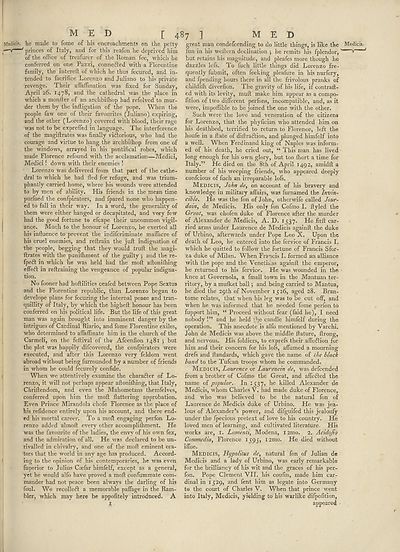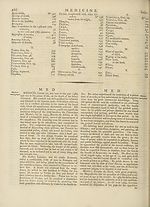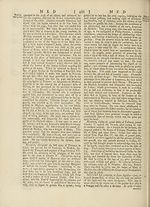Encyclopaedia Britannica, or, a Dictionary of arts, sciences, and miscellaneous literature : enlarged and improved. Illustrated with nearly six hundred engravings > Volume 13, MAT-MIC
(529) Page 487
Download files
Complete book:
Individual page:
Thumbnail gallery: Grid view | List view

MED [ 487 ] MED
Medicis. he made to fome of his encroachments on the petty
-'V-—' princes of Italy, and for this reafon he deprived him
of the office of treafurer of the Roman fee, which he
conferred on one Pazzi, connefled with a Florentine
family, the intereft of which he thus fecured, and in¬
tended to facrifice Lorenzo and Juliano to his private
revenge. Their affaffination was fixed for Sunday,
April 26. 1478, and the cathedral was the place in
which a monfier of an archbiffiop had refolved to mur¬
der them by the inftigation of the pope. When the
people faw one of their favourites (Juliano) expiring,
and the other (Lorenzo) covered with blood, their rage
was not to be expreffed in language. The interference
of the magiftrates was finally victorious, who had the
courage and virtue to hang the archbiffiop from one of
the windows, arrayed in his pontifical robes, which
made Florence refound with the acclamation—Medici,
Medici! down with their enemies !
Lorenzo was delivered from that part of the cathe¬
dral to which he had fled for refuge, and was trium¬
phantly carried home, where his wounds were attended
to by men of ability. His friends in the mean time
purfued the confpirators, and fpared none who happen¬
ed to fall in their wray. In a word, the generality of
them were either hanged or decapitated, and very few
had the good fortune to efcape their uncommon vigil¬
ance. Much to the honour of Lorenzo, he exerted all
his influence to prevent the indifcriminate maiTacre of
his cruel enemies, and reftrain the juft indignation of
the people, begging that they would truft the magi-
ftrates with the punifhment of the guilty 5 and the re-
fpeft in which he was held had the moft aftonifhing
effeft in reftraining the vengeance of popular indigna¬
tion.
No fooner had hoftilities ceafed between Pope Sextus
and the Florentine republic, than Lorenzo began to
develope plans for fecuring the internal peace and tran¬
quillity of Italy, by which the highefl: honour has been
conferred on his political life. But the life of this great
man was again brought into imminent danger by the
intrigues of Cardinal Riario, and fome Florentine exiles,
who determined to aflaffinate him in the church of the
Carmeli, on the feftival of the Afcenfion 1481 5 but
the plot was happily difcovered, the confpirators were
executed, and after this Lorenzo very feldom went
abroad without being furrounded by a number of friends
in whom he could fecurely confide.
When we attentively examine the chara&er of Lo¬
renzo, it will not perhaps appear aftoniffiing, that Italy,
Chriftendom, and even the Mahometans themfelves,
conferred upon him the mofi: flattering approbation.
Even Prince Mirandola chofe Florence as the place of
his refidence entirely upon his account, and there end¬
ed his mortal career. To a moll engaging perfon Lo¬
renzo added almofl: every other accompliffiment. He
was the favourite of the ladies, the envy of his own fex,
and the admiration of all. He was declared to be un¬
rivalled in chivalry, and one of the moft eminent ora¬
tors that the world in any age has produced. Accord¬
ing to the opinion of his contemporaries, he wTas even
fuperior to Julius Caefar himfelf, except as a general,
yet he would alfo have proved a moft confummate com¬
mander had not peace been always the darling of his
foul. We recoiled! a memorable pafiage in the Ram¬
bler, which may here be appofitely introduced. A
I
great man condefcending to do little things, is like the Medicls.
fun in his weftern declination •, he remits his fplendor, nt—"
but retains his magnitude, and pleafes more though he
dazzles lefs. To fuch little things did Lorenzo fre¬
quently fubmit, often feeking pleafure in his nurfery,
and fpending hours there in all the frivolous pranks of
childiffi diverfion. The gravity of his life, if contraft-
ed with its levity, muft make him appear as a compo-
fition of two different perfons, incompatible, and, as it
were, impoflible to be joined the one with the other.
Such were the love and veneration of the citizens
for Lorenzo, that the phyfician who attended him on
his deathbed, terrified to return to Florence, left the
houfe in a ftate of diffradlion, and plunged himfelf into
a well. When Ferdinand king of Naples was inform¬
ed of his death, he cried out, “ This man has lived
long enough for his own glory, but too fliort a time for
Italy.” He died on the 8th of April 1492, amidlt a
number of his weeping friends, who appeared deeply
confcious of fuch an irreparable lofs.
Medicis, Jo An Je, on account of his bravery and.
knowledge in military affairs, was furnamed the Invin¬
cible. He was the fon of John, otherwife called Jour-
dain, de Medicis. His only fon Cofmo I. ftyled the
Great, was chofen duke of Florence after the murder
of Alexander de Medicis, A. D. 1537. He firfl: car¬
ried arms under Laurence de Medicis againft the duke
of Urbino, afterwards under Pope Leo X. Upon the
death of Leo, he entered into the fervice of Francis I.
which he quitted to follow the fortune of Francis Sfor-
za duke of Milan. When Francis I. formed an alliance
with the pope and the Venetians againft the emperor,
he returned to his fervice. He was wounded in the
knee at Governola, a fmall town in the Mantuan ter¬
ritory, by a mulket ball; and being carried to Mantua,
he died the 29th of November 1526, aged 28. Bran-
tome relates, that when his leg was to be cut off, and
when he was informed that he needed fome perfon to
fupport him, “ Proceed without fear (faid he), I need
nobody !” and he held !;he candle himfelf during the
operation. This anecdote is alfo mentioned by Varchi.
John de Medicis was above the middle ftature, ftrong,
and nervous. His foldiers, to exprefs their affeflion for
him and their concern for his lofs, affumed a mourning
drefs and ftandards, which gave the name of the black
band to the Tufcan troops whom he commanded.
Medicis, Laurence or Laurencin de, wras defcended
from a brother of Cofmo the Great, and affedled the
name of popular. In 1537, he killed Alexander de
Medicis, whom Charles V. had made duke of Florence,
and who was believed to be the natural fon of
Laurence de Medicis duke of Urbino. Fie was jea¬
lous of Alexander’s power, and difguifed this jealoufy
under the fpecious pretext of love to his country. He
loved men of learning, and cultivated literature. His
works are, I. Lamenti, Modena, izmo. 2. Acidojio
Commedia, Florence 1595, l2mo. He died without
iffue.
Medicis, Hypolitus de, natural fon of Julian de
Medicis and a lady of Urbino, was early remarkable
for the brilliancy of his wit and the graces of his per¬
fon. Pope Clement VII. his coufin, made him car¬
dinal in 1529, and fent him as legate into Germany
to the court of Charles V. When that prince went
into Italy, Medicis, yielding to his warlike difpcfition,
appeared
Medicis. he made to fome of his encroachments on the petty
-'V-—' princes of Italy, and for this reafon he deprived him
of the office of treafurer of the Roman fee, which he
conferred on one Pazzi, connefled with a Florentine
family, the intereft of which he thus fecured, and in¬
tended to facrifice Lorenzo and Juliano to his private
revenge. Their affaffination was fixed for Sunday,
April 26. 1478, and the cathedral was the place in
which a monfier of an archbiffiop had refolved to mur¬
der them by the inftigation of the pope. When the
people faw one of their favourites (Juliano) expiring,
and the other (Lorenzo) covered with blood, their rage
was not to be expreffed in language. The interference
of the magiftrates was finally victorious, who had the
courage and virtue to hang the archbiffiop from one of
the windows, arrayed in his pontifical robes, which
made Florence refound with the acclamation—Medici,
Medici! down with their enemies !
Lorenzo was delivered from that part of the cathe¬
dral to which he had fled for refuge, and was trium¬
phantly carried home, where his wounds were attended
to by men of ability. His friends in the mean time
purfued the confpirators, and fpared none who happen¬
ed to fall in their wray. In a word, the generality of
them were either hanged or decapitated, and very few
had the good fortune to efcape their uncommon vigil¬
ance. Much to the honour of Lorenzo, he exerted all
his influence to prevent the indifcriminate maiTacre of
his cruel enemies, and reftrain the juft indignation of
the people, begging that they would truft the magi-
ftrates with the punifhment of the guilty 5 and the re-
fpeft in which he was held had the moft aftonifhing
effeft in reftraining the vengeance of popular indigna¬
tion.
No fooner had hoftilities ceafed between Pope Sextus
and the Florentine republic, than Lorenzo began to
develope plans for fecuring the internal peace and tran¬
quillity of Italy, by which the highefl: honour has been
conferred on his political life. But the life of this great
man was again brought into imminent danger by the
intrigues of Cardinal Riario, and fome Florentine exiles,
who determined to aflaffinate him in the church of the
Carmeli, on the feftival of the Afcenfion 1481 5 but
the plot was happily difcovered, the confpirators were
executed, and after this Lorenzo very feldom went
abroad without being furrounded by a number of friends
in whom he could fecurely confide.
When we attentively examine the chara&er of Lo¬
renzo, it will not perhaps appear aftoniffiing, that Italy,
Chriftendom, and even the Mahometans themfelves,
conferred upon him the mofi: flattering approbation.
Even Prince Mirandola chofe Florence as the place of
his refidence entirely upon his account, and there end¬
ed his mortal career. To a moll engaging perfon Lo¬
renzo added almofl: every other accompliffiment. He
was the favourite of the ladies, the envy of his own fex,
and the admiration of all. He was declared to be un¬
rivalled in chivalry, and one of the moft eminent ora¬
tors that the world in any age has produced. Accord¬
ing to the opinion of his contemporaries, he wTas even
fuperior to Julius Caefar himfelf, except as a general,
yet he would alfo have proved a moft confummate com¬
mander had not peace been always the darling of his
foul. We recoiled! a memorable pafiage in the Ram¬
bler, which may here be appofitely introduced. A
I
great man condefcending to do little things, is like the Medicls.
fun in his weftern declination •, he remits his fplendor, nt—"
but retains his magnitude, and pleafes more though he
dazzles lefs. To fuch little things did Lorenzo fre¬
quently fubmit, often feeking pleafure in his nurfery,
and fpending hours there in all the frivolous pranks of
childiffi diverfion. The gravity of his life, if contraft-
ed with its levity, muft make him appear as a compo-
fition of two different perfons, incompatible, and, as it
were, impoflible to be joined the one with the other.
Such were the love and veneration of the citizens
for Lorenzo, that the phyfician who attended him on
his deathbed, terrified to return to Florence, left the
houfe in a ftate of diffradlion, and plunged himfelf into
a well. When Ferdinand king of Naples was inform¬
ed of his death, he cried out, “ This man has lived
long enough for his own glory, but too fliort a time for
Italy.” He died on the 8th of April 1492, amidlt a
number of his weeping friends, who appeared deeply
confcious of fuch an irreparable lofs.
Medicis, Jo An Je, on account of his bravery and.
knowledge in military affairs, was furnamed the Invin¬
cible. He was the fon of John, otherwife called Jour-
dain, de Medicis. His only fon Cofmo I. ftyled the
Great, was chofen duke of Florence after the murder
of Alexander de Medicis, A. D. 1537. He firfl: car¬
ried arms under Laurence de Medicis againft the duke
of Urbino, afterwards under Pope Leo X. Upon the
death of Leo, he entered into the fervice of Francis I.
which he quitted to follow the fortune of Francis Sfor-
za duke of Milan. When Francis I. formed an alliance
with the pope and the Venetians againft the emperor,
he returned to his fervice. He was wounded in the
knee at Governola, a fmall town in the Mantuan ter¬
ritory, by a mulket ball; and being carried to Mantua,
he died the 29th of November 1526, aged 28. Bran-
tome relates, that when his leg was to be cut off, and
when he was informed that he needed fome perfon to
fupport him, “ Proceed without fear (faid he), I need
nobody !” and he held !;he candle himfelf during the
operation. This anecdote is alfo mentioned by Varchi.
John de Medicis was above the middle ftature, ftrong,
and nervous. His foldiers, to exprefs their affeflion for
him and their concern for his lofs, affumed a mourning
drefs and ftandards, which gave the name of the black
band to the Tufcan troops whom he commanded.
Medicis, Laurence or Laurencin de, wras defcended
from a brother of Cofmo the Great, and affedled the
name of popular. In 1537, he killed Alexander de
Medicis, whom Charles V. had made duke of Florence,
and who was believed to be the natural fon of
Laurence de Medicis duke of Urbino. Fie was jea¬
lous of Alexander’s power, and difguifed this jealoufy
under the fpecious pretext of love to his country. He
loved men of learning, and cultivated literature. His
works are, I. Lamenti, Modena, izmo. 2. Acidojio
Commedia, Florence 1595, l2mo. He died without
iffue.
Medicis, Hypolitus de, natural fon of Julian de
Medicis and a lady of Urbino, was early remarkable
for the brilliancy of his wit and the graces of his per¬
fon. Pope Clement VII. his coufin, made him car¬
dinal in 1529, and fent him as legate into Germany
to the court of Charles V. When that prince went
into Italy, Medicis, yielding to his warlike difpcfition,
appeared
Set display mode to:
![]() Universal Viewer |
Universal Viewer | ![]() Mirador |
Large image | Transcription
Mirador |
Large image | Transcription
Images and transcriptions on this page, including medium image downloads, may be used under the Creative Commons Attribution 4.0 International Licence unless otherwise stated. ![]()
| Permanent URL | https://digital.nls.uk/192668039 |
|---|
| Attribution and copyright: |
|
|---|
| Description | Ten editions of 'Encyclopaedia Britannica', issued from 1768-1903, in 231 volumes. Originally issued in 100 weekly parts (3 volumes) between 1768 and 1771 by publishers: Colin Macfarquhar and Andrew Bell (Edinburgh); editor: William Smellie: engraver: Andrew Bell. Expanded editions in the 19th century featured more volumes and contributions from leading experts in their fields. Managed and published in Edinburgh up to the 9th edition (25 volumes, from 1875-1889); the 10th edition (1902-1903) re-issued the 9th edition, with 11 supplementary volumes. |
|---|---|
| Additional NLS resources: |
|

